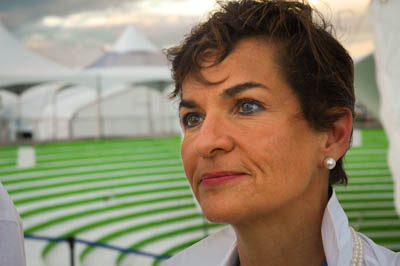The European Union has welcomed the results of the Cancún climate conference as an important step towards a global framework for climate action.
The UN Climate Change Conference in Cancún, Mexico, ended on Saturday with the adoption of a package dubbed the “Cancún Agreements”, outlined below.
The EU said the Cancún Agreement represents an important further step on the road to building a comprehensive and legally binding framework for climate action for the period after 2012.
“The EU came to Cancún to get a substantial package of action-oriented decisions and keep the international climate change negotiations on track,” said Connie Hedegaard, European Commissioner for Climate Action.
“We have helped to deliver the successful outcome the world expected and needed. But the two weeks in Cancún have shown once again how slow and difficult the process is. Everyone needs to be aware that we still have a long and challenging journey ahead of us to reach the goal of a legally binding global climate framework.”

Christiana Figueres, executive secretary of the UNFCCC, pictured visiting the Climate Change Village
The package was welcomed by the UNFCCC (United Nations Framework Convention on Climate Change) executive secretary Christiana Figueres, who conceded that “this is not the end, but it is a new beginning.
“It is not what is ultimately required but it is the essential foundation on which to build greater, collective ambition,” she said.
Some of the key elements of the “Cancún Agreements”, according to the UNFCCC are:
- Industrialised country targets are officially recognised under the multilateral process and these countries are to develop low-carbon development plans and strategies and assess how best to meet them, including through market mechanisms, and to report their inventories annually.
- Developing country actions to reduce emissions are officially recognised under the multilateral process. A registry is to be set up to record and match developing country mitigation actions to finance and technology support from industrialised countries. Developing countries are to publish progress reports every two years.
- Parties meeting under the Kyoto Protocol agree to continue negotiations with the aim of completing their work and ensuring there is no gap between the first and second commitment periods of the treaty.
- The Kyoto Protocol’s Clean Development Mechanisms has been strengthened to drive more major investments and technology into environmentally sound and sustainable emission reduction projects in the developing world.
- Parties launched a set of initiatives and institutions to protect the vulnerable from climate change and to deploy the money and technology that developing countries need to plan and build their own sustainable futures.
- A total of US$30bn in fast start finance from industrialised countries to support climate action in the developing world up to 2012 and the intention to raise $100bn in long-term funds by 2020 is included in the decisions.
- In the field of climate finance, a process to design a Green Climate Fund under the Conference of the Parties, with a board with equal representation from developed and developing countries, is established.
- A new ‘Cancún Adaptation Framework’ is established to allow better planning and implementation of adaptation projects in developing countries through increased financial and technical support, including a clear process for continuing work on loss and damage.
- Governments agree to boost action to curb emissions from deforestation and forest degradation in developing countries with technological and financial support.
- Parties have established a technology mechanism with a Technology Executive Committee and Climate Technology Centre and Network to increase technology co-operation to support action on adaptation and mitigation.
The next Conference of the Parties (COP17) is scheduled to take place in South Africa, from 28 November to 9 December 2011.
This article originally appeared in the Sustainability section of Businessandleadership.com.